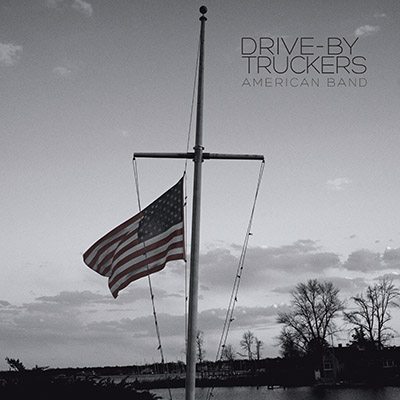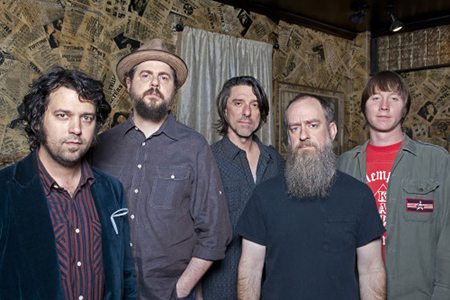
On the cover of The Drive-By Truckers’ new album “American Band” is a striking black-and-white photo of an American flag luffing at half-staff. Absent is the artwork of Wes Freed, who has adorned the covers of the band’s albums since 2002’s “Southern Rock Opera” with colorful, ruggedly gothic paintings of the types of people and places found in the Truckers’ world. Instead, it is a snapshot of what America looks and feels like to a lot of people in the country in 2016 — stark, black-and-white, wounded and not waving proudly.
The deeper you look back at where America has come from, though, it becomes obvious that for a lot of communities it has always appeared this bleak. What stalwart songwriters Mike Cooley and Patterson Hood offer on “American Band” is their observations of America as they see it, and in doing so, give voices to the people that usually don’t have the power; the victims of gun violence, minorities, Southerners who color the ballot blue.
There have been a number of albums released over the last couple of years that have been powerful, artistic manifestations of the racial turmoil that recently has returned to the forefront of the national discussion: D’Angelo & the Vanguard’s “Black Messiah,” The Roots’ “… And Then You Shoot Your Cousin,” Kendrick Lamar’s “To Pimp A Butterfly” and, to a certain extent, Beyonce’s “Lemonade.” These records all present the black experience and what is happening in these communities from the perspective of the people who are living it. Ferguson, Baltimore, Charlotte and all across the nation, incidents are flaring that show the violent ends minorities have met at the hands of police force, more often than not shrouded in unsatisfactory justifications. It is a frustrating, tense, and sad time for many people across the nation and The Drive-By Truckers offer its own perspective of what is unfolding on the TVs and newsfeeds across the nation with Hood’s “What It Means.”

No song deals with the tension and violence that is bred from fear of the other more bluntly than Hood’s observational ballad. Hood wrote the song in the aftermath of Ferguson and Eric Garner and even weaves the deaths of Michael Brown and Trayvon Martin into the song’s thoughtful questioning of the madness being played out in the streets. The song is heavy on the soul, highlighting the two racialized worlds that people in America live in, Hood laying it out in simple terms when he sings, “There’s just two sides calling names out of anger, out of fear/ and if you say it wasn’t racial when they shot him in his tracks/ we’ll I guess that means that you ain’t black, it means that you ain’t black/ I mean Barack Obama won and you can choose where to eat/ but you don’t see too many white kids lying bleeding on the street.” Despite the weight of Hood’s words, the song is not a pessimistic meditation, but rather a questioning of the status quo and a hope for a shift that he believes is within our grasp if if we are now landing on comets.
“What It Means” also is an implicit championing of the Black Lives Matter movement and an acknowledgement that there are things that need to change across racial lines, a significant stance considering not too many white, middle-aged guys from the deep South without a college education are among its vocal supporters. A lot of “American Band” is centered around challenging the stereotypes that people might have about people who fit the Truckers’ description and making sure it is known that what it means to be American is as varied as the people that make up the nation.
The album opens with the sterling rock and roll track “Ramon Casiano,” a retelling of the killing of the 15-year old Mexican boy by influential NRA leader Harlon Carter in 1931. “It all started at the border and that’s where it is all still today,” rolls the first line from Cooley’s mouth as the song rides a wide-open rhythm that Cooley floats slick guitar lines over. The shimmering organ, the gleaming guitars, the steady rhythm — the song feels like Bruce Springsteen’s America at its best. It is also America at its worst and highlights that we haven’t moved too far from that as we look at the current strife and tension surrounding immigration on the Mexican border.
The dichotomy between the way the music sounds and the story being told plays itself out again in the devastatingly beautiful “Guns of Umpqua,” written in response to the fatal shooting at Umpqua Community College. Acoustic guitars, tender keyboards and a delicate melody recreate the pristine calm of Oregon in the fall as Hood details the beauty of life existing in such an environment. It’s one of the prettiest songs DBT has ever written musically and Hood brings to that world the terrifying reality of guns in America, Hood singing “Heaven is calling my name from the hallway outside the door” like an unwilling angel ascending to eternity.
After taking on guns and race relations, Hood and Cooley continue to speak their minds about the people who supposedly represent them in the back-to-back combo of “Kinky Hypocrite” and “Ever South.” The former is a searing indictment from Cooley of the self-proclaimed pious, God-fearing politicians and preachers “whose boots scooting off a goose-step of a rhythm to a simpler time” as they endulge in the kinkiest of vices behind closed doors. The hot take is matched by the drunken, barroom swagger of the blues rock and roller from the band, a surefire future standout on the stage.
Cooley’s burn is soothed in Hood’s tough-love ballad of Southern legacy. He reflects on how his ancestors “spread through Appalachia” and had to carve their own slice of life amidst a hostile culture and environment. Hood is proud of what his family has accomplished and acknowledges the strife it has endured, yet, he believes that that proud Southern heritage is tarnishing itself in this day and age by continuing to perpetuate divisive, racist ideals and customs. His voice rises as he sings, “take your stand for noble causes till you can’t stand no more, surrender to some savior praise the lord/ but despite our best intentions it pains me to report that we keep swinging for the fences, coming up a little short/ we sure can get it wrong for someone so devout, I hear you whistlin’ past the graveyard looking down.” It’s a call to move forward, a hope that progress can be made.
Like every Drive-By Truckers album, the full weight of “American Band” won’t be felt until after a lot of time spent letting the melodies seep into your consciousness and letting the stories marinate in your soul, years usually. Hopefully, in that time we’ll see some of the issues addressed on the album play out less and less in the nation. The greatest hope we can have for “American Band” down the line is that it will be a snapshot of what the country used to be, not what it still is.
-Garrett Bethmann
Related stories:
-Drive-By Trucker’s emotionally charged show at Lake Tahoe. LINK
-Interview with Patterson Hood about “American Band.” LINK

